TV Station RKB
Tech Innovators in Japan ①Tasty Rice Straws! ②From Fukuoka, a Godsend of a Mower!
DC292346![]()
世界一の九州が始まる①「美味しい!?米ストロー」②「福岡発!!親孝行で楽しい草刈り機」 [RKB]
![]()
![]()







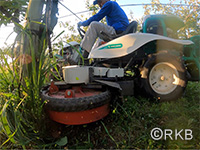


|Length : 20min |Year : 2023 |
①While the use of environmentally friendly paper straws has increased, the straws produced by UPay Co., Ltd. president, Yui Jokan (41) are made of 70% rice and 30% cornstarch. After use, they can be boiled and eaten like pasta, but they will also break down completely in soil. They are unaffected by long immersion in water and with their smooth texture, they are popular with eateries that serve customers with little children.
A new recycling law amendment aimed at reducing the use of plastics has plastic straws in its sights. Their small size makes them prone to escaping the confines of trash bags or disposal facilities and ending up in the ocean. Ms. Jokan decided to challenge this environmental problem. She uses broken rice grains that would otherwise have no value. Using such rice would lead to more profitability for rice farmers and be a solution for the problem of food loss.
②The go-kart-like riding mower built by OREC CO., LTD. in Fukuoka City was developed by current president Takeji Imamura (70), who came up with the idea 35 years ago to help farmers weed under trees. Although his idea was dismissed by management, his stick-to-itiveness finally bore fruit.
On farms, teens who had been avoiding grass cutting were suddenly volunteering to jump on the fun go-kart mowers. Pres. Imamura is proud of what his customers call a “godsend.” OREC has top share of the self-propelled mower market in Japan, with additional machines designed especially for hilly fields or radio-controlled ones that can maneuver under low solar panels. Tires with special blades keep mowers from sliding down steep slopes. Beyond mowers, OREC has also developed a device that makes it possible to erase smells and bacteria from livestock barns.
By solving difficulties farmers face, OREC is helping to make farm work easier, more fun, and more attractive to young people.
Tech Innovators in Japan~①Evolving Traditional Japanese Crafts ②Tackling Poverty Through Mom’s Herb Tea~
DC291939![]()
世界一の九州が始まる! ①暮らしを“結ぶ”!進化する博多水引 ②貧困を救う!ママのハーブティ [RKB]
![]()
![]()
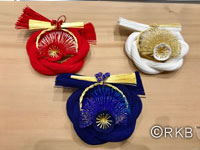
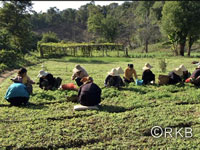
|Length : 25 |Year : 2019 |
①Evolving Traditional Japanese Crafts
Mizuhiki are bands of cord used for example to wrap around gifts and envelopes, essential as decorative ties used on celebratory occasions in Japan. Also used on paper fortunes and protective charms sold at shrines, since ancient times mizuhiki have been considered as sacred ties that relay feelings and connect people. These mizuhiki are now acquiring forms that take them beyond their original use and are blending into everyday life. Continuing a challenge to bring these items into every part of our lives, including food, clothing and housing, are a father and daughter who run a long-established mizuhiki shop in Hakata. Father Hiroaki Nagasawa maintains the mizuhiki tradition, while daughter Hiromi works on the design and production of items with new styles for use on apparel or for daily living which respect that tradition. Hiromi says, “By incorporating design into traditional crafts, tradition becomes a much more familiar presence.”
②Tackling Poverty Through Mom’s Herb Tea
There is an organic herb tea in Japan which realizes annual sales of US$8 million. This herb tea is treasured by mothers who are raising their infants on breast milk. It first went on sale 10 years ago, and is now a popular product at 15% of maternity hospitals in Japan, which sell it or give it as a present to mothers when they leave the hospital. However, the story does not end there. Behind these herb tea sales is a substantial project which is resolving the problems of poverty where the herbs are produced in the village of Linlae, Myanmar. For many years the village has been growing tobacco, but this brought the hardships of poverty which resulted from factors such as the harmful effects of agrichemicals and unstable yield. With this, a proposal was made to villagers that they switch from tobacco to herb cultivation. Through guaranteed purchase of herb production, there has been a great improvement in their lives.
SPIRIT OF JAPAN Uplifting Doll Makers! Hakata Gion Yamakasa
DC272443![]()
日本のチカラ 人形師翔る! 父と子の追い山笠 [RKB]
![]()
![]()
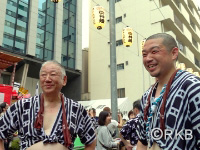


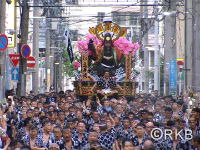
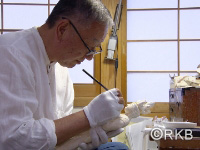
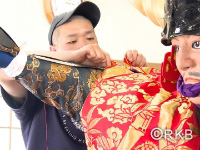
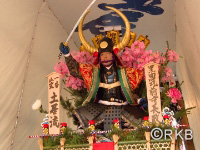
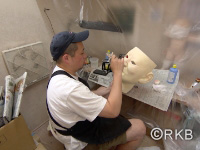
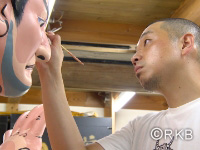
|Length : 25min |Year : 2024 |
Hakata dolls, a traditional craft of Fukuoka, are facing a decline, with the number of doll makers halved since the 1950s.
However, Shinkyo and his son Hiromine Nakamura, from the century-old ‘Nakamura Ningyo’ family, continue to receive orders. Shinkyo (67), a leading figure in the industry, has won many awards, while Hiromine (38) is known for his innovative approach to Hakata doll-making.
The doll makers in Hakata are most honored to make the ‘Kaki Yama,’ the ‘running Yamakasa’ at the Hakata Gion Yamakasa Festival. It is highly competitive, with no guarantee of future commissions.
In 2023, Hiromine created dolls of Nagamasa Kuroda, the first lord of Fukuoka more than 400 years ago, and his famous father, Kanbee, for the festival. Nakamura’s family motto is ‘Never create the same thing as the previous generation’; Hiromine follows this by producing unique dolls each year. For the unveiling, he displayed the same-sized dolls of Nagamasa and Kanbee back to back. The people of Doi Nagare, who ordered the dolls, were deeply moved and amazed, saying, ‘The dolls are father and son, just like the doll makers.’
Capture the Wind – The Wind-Lens Turbine and the Future of Energy
DC221220![]()
風を集めて“レンズ風車”未来への挑戦 [RKB]
![]()
![]()

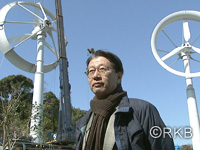
|Length : 46min. |Year : 2012 |
March 11, 2011—the day the Great East Japan Earthquake struck off the coast of Tohoku and caused a serious accident at the Fukushima No.1 Power Plant. Japan, which had relied on nuclear power for much of its energy, found itself at crossroads: how would it secure its energy future?
Coincidentally, this was the same day that two odd-shaped wind turbines were erected in Fukuoka City. The wind-lens turbine, a turbine with a unique brim surrounding its blades, was the brainchild of Kyushu University professor Yuji Ohya. Able to generate three times as much power as conventional wind turbines, it was a dream-inspiring machine. On the same day that Professor Ohya made his case for the need to shift to renewable energy, the Great East Japan Earthquake struck.
Previously, Professor Ohya had erected wind-lens turbines in China to provide energy for desert greenification, but they were destroyed, unable to withstand the harsh winds. As problems like these arose, Professor Ohya and his team resolved them one by one, gradually improving the turbine design.
With very few high wind areas on land, how can Japan increase wind power generation? According to Professor Ohya, the answer lies on the ocean. His dream is to use floating wind-lens turbines to create offshore energy farms. Experiments are now underway, and his team aims to build an offshore energy farm that will someday produce the same amount of power as a nuclear power plant.
This is the story of the researchers who worked tirelessly to develop the wind-lens turbine and the small factory workers who provided the technical support they needed. Above and beyond the goal of solving Japan's energy issues, their undertaking holds a clue for Japan's post-disaster recovery.














